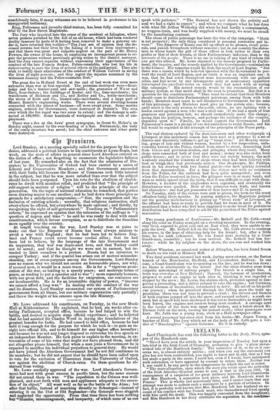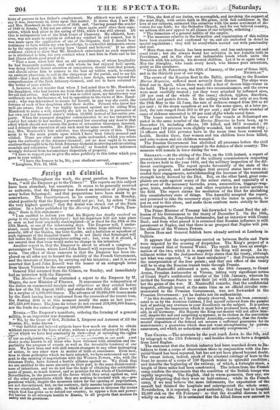IRELAND.
Lord Clanricarde has sent the following letter to the Daily barn, apro- pos of the Handcock case. "Sir—I have seen the article in your impression of Tuesday last upon a late trial in the Irish Court of Chancery, professing to give 'a plain unvar- nished tale of the Haideock family. The substance of it, so far as it con- cerns me, is almost entirely untrue ; and when you say the statement yon give has not been contradicted, you ought to know and to add, that as I was not made a party in the cause, I could not, even if I would, have anticipated such calumnies, or have appeared by counsel to refute them. Neither was I, nor could I, be any party to the compromise by which the suit is ended.
"The main allegation, upon which the story you relate upon the authority of the Irish Attorney-General seems to rest, is that in the year 1841,
consequeuce of a suspicion of too great intimacy between Lord Clanricarde and Mrs. Handcock, a separation took place and Mr. Handcock went to Prance.' This is wholly and notoriously falai; and I cannot learn that any attempt was made to sustain such a statement by a particle of evidence. In fact, it is perfectly well known that Mrs. Handcock left her husband on ac- count of his conduct with her French maid, who theneeforward lived openly with him until his death. This .was happily concealed from the daughters; and Miss Handcock in her diary attributes the separation to the macbias. tions of persons in her father's employment. My affidavit was not, as you say it was, inaccurate in dates upon this matter. It states that I saw Mr. and Mrs. Handcock in the autumn of 1840, and, ' having passed the winter of 1840 in Russia,' I did not see either of them again until after their sepa- ration, which took place in the spring of 1841, while I was still abroad. All this is indisputable out of the Irish Court of Chancery. My affidavit, how- ever, was not made to explain or defend my conduct in any respect, but it was made upon the application of one of the litigants, that I should bear testimony to facts within my own knowledge, to contradict statements sworn to by the opposite party as having been heard and believed.' If no other evidence existed to show that Mr. Handcock entertained no such suspicion as is attributed to him, his own conduct when I met him in Paris and in his last illness affords good proof of it. "That a man, when told that an old acquaintance, of whose hospitality lie had frequently partaken, and with whom he had enjoyed field sports, was dying without decent attention or companions, should visit that person, and should advise him to remove to the best air within reach, to consult an eminent physician, to call in the clergyman of the parish, and to see his child—that a man should do this without a base design, seems beyond the comprehension of the Irish Attorney-General, and not to have occurred to the writer of your article. I, however, do not wonder that when I had acted thus to Mr. Handcock, his daughters, who had known me from their childhood, should recur to me foraid and advice. And whenever I was so called upon, my interference was uniformly not in furtherance of, but in opposition to the views of Mrs. Hand- cock ; who was determined to secure for herself, in any way she could, the fortune of each of her daughters after their deaths. Persons who knew her well are aware, that she was highly incensed against me for aiding Miss Handcock to make a will, whereby she left to her mother, in pursuance of her own and her deceased sister's wishes, 10,0001. instead of her entire pro- perty. When the youngest daughter communicated to me her intention to convey her estate to her mother, I prevented her executing any deed to that effect which should not contain the power of revocation thereupon inserted, and I delayed the execution of any such deed for some months. Mr. Blake- ney, Mrs. Handcock's late solicitor, was thoroughly aware of this. These seem to be the main points upon which I have been falsely accused and vilified. There are other minor points, quite unfounded, which you relate upon the authority of the Attorney-General : yet no man ought to be more cautious than ought to be the Irish Attorney-General in uttering and circulating scandals and calumnies heard and believed,' or founded upon inferences wrongly deduced from testamentary disposition of property. "I have to request you to give the same publicity to this letter which you gave to your article.
"I have the honour to be, Sir, your obedient servant,



































 Previous page
Previous page